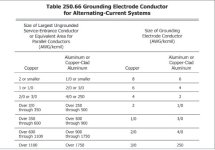arlen4720
Veteran Member
- Joined
- Jul 6, 2012
- Messages
- 1,277
- Location
- Southeast Minnesota
- Tractor
- JD 4720, JD X748SE, JD 997, Farmall "B", Gator 865R, JD 320D Skid Steer
Exactly right!
...so why does the grounding electrode conductor connecting the neutral to the grounding electrode system of a 400 amp service have to be a different size than a 100 amp service? (i.e. is there any logical reason?)
Ground faults can occur anywhere in the system, so the grounding electrode conductor has to be sized to carry the fault current back to the main bonding jumper wherever the fault occurs so the overcurrent device will trip.
You will find that the code does not require a grounding electrode conductor larger than 6AWG to ever be connected to a ground rod, regardless of the size of service. This is because it is understood that the #6 wire will be able to carry all the current that a ground rod is capable of disapating. This only applies to driven electrodes, not the Ufer ground, or the water main, etc.
The SOARS book on grounding is considered the authority on grounding.

